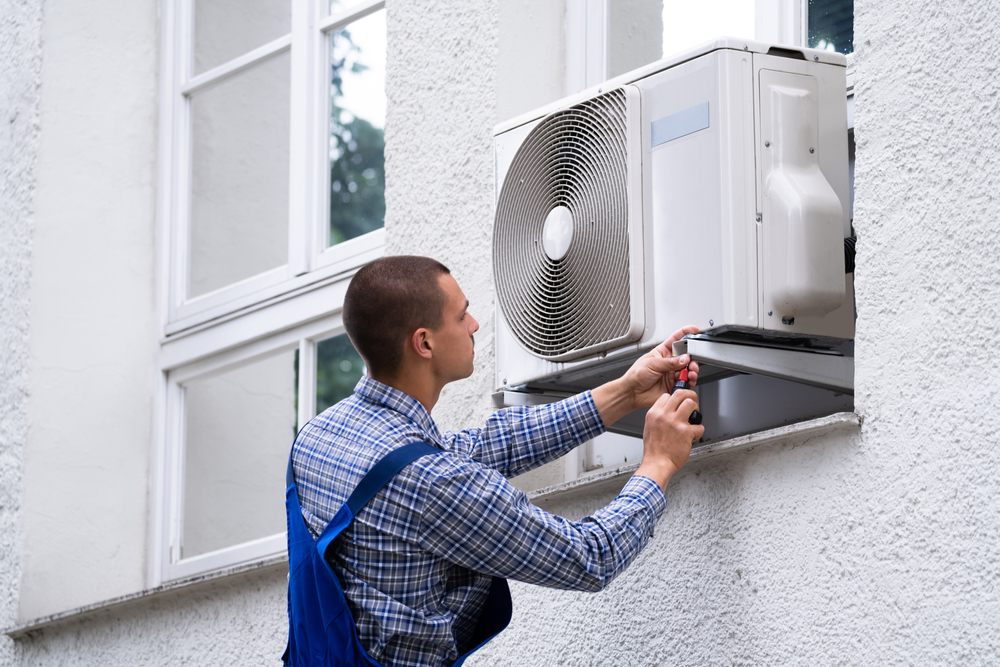
When the summer heat arrives in full force, but your AC isn’t keeping your home cool like it used to, low refrigerant could be the culprit. Refrigerant is the essential chemical that absorbs heat from your home and releases it outside, also commonly known as Freon.
When Freon levels drop, often due to a hidden leak, your air conditioner struggles to maintain a comfortable temperature in your home.
In this guide, we’ll walk through the top signs that your AC is low on Freon, what causes refrigerant loss, and why adding Freon to your AC is never a DIY fix.
Let’s start by breaking down what exactly Freon does.
What Is Freon and Why Does Your AC Need It?
Refrigerant—often referred to as Freon—is a chemical that cycles through your air conditioning system to absorb heat indoors and release it outdoors. Without the right amount of refrigerant, your system can’t cool your home effectively.
Important to note: refrigerant doesn’t get “used up.” Your AC is a sealed system, so if it’s low on Freon, there’s likely a leak that needs to be repaired.
Top Signs Your AC Might Be Low on Freon
If something feels off with your cooling system, don’t ignore it. Here are the most common signs of low refrigerant levels:
1. Warm Air Blowing from Vents
When your system runs but still blows warm or room-temperature air, it’s often a clear sign of low Freon. Without enough refrigerant to absorb heat, your AC can’t provide cold air, even if the fan is running normally.
2. AC Runs Constantly Without Cooling the Home
An AC low on refrigerant will work harder and run longer, often without ever reaching your desired temperature. If your system seems to never cycle off, it’s time to get a professional diagnosis.
3. Hissing or Bubbling Sounds
Freon leaks are sometimes audible. Hissing indicates gas escaping under pressure, while bubbling may suggest a leak in the liquid line. These sounds often come from around the outdoor unit or refrigerant lines.
4. Higher-Than-Normal Energy Bills
When refrigerant levels drop, your system compensates by working overtime. That means more electricity is used up, resulting in a noticeable increase in your monthly energy bill.
5. Inconsistent Room Temperatures
Low Freon levels can result in uneven cooling throughout your home. This is noticeable when you start finding that one of your rooms is cold while others remain stuffy or warm, especially in multi-zone systems or larger homes.
6. Water Leaking Around Indoor Unit
This one surprises many homeowners. When the refrigerant is low, the evaporator coil can freeze over. Once it thaws, it may cause pooling or dripping water near your indoor unit. It’s a red flag that should never be ignored.
What Causes Refrigerant Levels to Drop?
Your AC system is designed to be airtight, so if your Freon levels are low, that’s a red flag. It usually signals to you that there’s a leak somewhere, often caused by wear and tear, corrosion, or damage from the elements.
Let’s look at the common culprits that could be behind your low refrigerant:
Pinhole Leaks in the Copper Line
Over time, the copper tubing that carries refrigerant can develop tiny pinhole leaks. These may form due to formic acid corrosion, which is common in certain environments and building materials. Even small leaks can slowly bleed out refrigerant and reduce system performance.
Worn Seals or Loose Connections
The connections between AC components are sealed with gaskets and fittings. These seals can wear out, shift, or crack, especially after years of use or during extreme temperature swings. When that happens, Freon can escape even without visible damage.
Corrosion in the Evaporator Coil
The evaporator coil sits inside your indoor unit, where it’s responsible for absorbing heat. But over time, it becomes vulnerable to corrosion from moisture, chemicals, or dirty air filters. Coil corrosion can lead to microscopic leaks that are difficult to detect without specialized tools.
Physical Damage from Outdoor Debris or Vibration
The outdoor condenser unit is exposed to the elements. Things like storm debris, pests, or even excessive vibration can cause physical damage to refrigerant lines. A dented or cracked line can lead to a significant loss of Freon.
Is It Safe to Keep Running an AC with Low Refrigerant?
Running your AC with low Freon is risky. Not only does it strain the system, but it can also lead to major damage, especially to your compressor, one of the most expensive parts to replace.
What’s more, low refrigerant causes your system to freeze up, overheat, or short-cycle, all of which reduce its lifespan.
If you suspect low Freon, the best move is to shut the system off and call our experienced team right away for an inspection. We’ll be there in a flash, ready to identify and resolve the issue.
How HVAC Pros Detect Low Freon Levels
Only certified HVAC professionals are authorized to check and recharge refrigerant levels legally. That’s because they use a combination of tools and techniques to pinpoint the issue, including:
- Pressure Gauges: Measure refrigerant pressure to detect low levels
- Electronic Leak Detectors: Sniff out escaping Freon
- UV Dye Testing: A special dye is added to the system to trace leaks under a UV light
- Soap Bubble Test: A simple method to spot bubbling at connection points
It is best to leave this task to professionals, as improper handling of refrigerants is regulated by the EPA. Additionally, checking freon levels yourself can cause damage to your system and the environment.
Can You Add Freon to Your AC Yourself?
The short answer? No, and you shouldn’t try to add Freon by yourself. Refrigerants are regulated under EPA Section 608, and only licensed technicians are allowed to handle them.
Attempting to recharge your system without proper training can lead to serious issues, including overcharging or undercharging the system, which can damage critical components.
There’s also the risk of environmental violations if Freon is released improperly, not to mention the possibility of voiding your HVAC warranty altogether. It’s simply not worth the risk—leave it to the pros.
While you may be able to buy a freon canister online, there’s no safe or legal way to recharge your system without the proper tools and certification.
Always trust an HVAC professional to inspect, test, and refill your refrigerant.
How Much Does It Cost to Recharge AC Refrigerant?
The cost to recharge your AC with Freon depends on a few key factors:
- Type of Refrigerant:
If your system uses older R-22 (Freon), expect higher costs. R-22 has been phased out, making it less available and more expensive than modern alternatives like R-410A. - Amount Needed:
Larger HVAC systems—or those with significant leaks—will require more refrigerant to reach proper levels, which can increase the total cost. - Repair Needs:
If a leak is detected, it must be repaired before recharging. This adds labor and material costs, but it’s essential for long-term performance and safety.
As of 2025, expect recharges to range anywhere from $150 to $600 or more, depending on system size and refrigerant type. Your best option? Get a comprehensive system diagnosis to avoid recurring issues and prevent wasting money on expensive repair bills.
Why Call Gulf Shore Cooling for Refrigerant Issues?
At Gulf Shore Cooling, we understand the importance of keeping your AC running safely and efficiently, especially in the Florida heat. With roots dating back to the 1980s as Gulf Coast Cooling, our company has built a reputation for dependable HVAC service across the region.
After relaunching as Gulf Shore Cooling in 2000, we’ve continued to grow while staying true to our founding mission: delivering expert care with a local touch.
Today, our technicians are EPA-certified and fully trained to handle refrigerant leaks, equipped with the latest tools to diagnose and repair cooling issues quickly and accurately.
We offer:
- Fast, accurate diagnosis and safe refrigerant recharging
- Long-term repair solutions—no temporary band-aid fixes
- Fully permitted and inspected work that meets local codes
- Transparent service that protects your system’s warranty
- Over 25 years of trusted, high-quality cooling expertise
Trust our AC services team to get your system back to cooling your home the way it should.
Contact Gulf Shore Cooling for AC Refrigerant Diagnosis and Recharge Services
If your air conditioner is showing signs of low Freon, contact Gulf Shore Cooling for a quick AC refrigerant diagnosis and recharge.
We offer transparent pricing and experienced local technicians who care about your comfort and peace of mind. Just give us a call today at (239) 232-6653 or contact us online to schedule your service.
You can count on us for fast, professional AC repair and reliable solutions that keep your home comfortable year-round.
AC Refrigerant FAQ
How long should Freon last in an AC system?
Ideally, your Freon should last as long as the life of the system. Since refrigerant circulates in a closed loop, it should never need to be topped off unless there’s a leak or damage.
How often do I need to recharge my AC?
You should never have to unless there’s an apparent system malfunction. If your system needs frequent recharges, that’s a sign of a persistent leak that should be repaired, not masked.
Do heat pumps use the same refrigerant as ACs?
Yes. Heat pumps and central AC systems use the same type of refrigerant, like R-410A or R-22 in older systems. The only difference is how they reverse the flow of refrigerant during heating mode.
Does an HVAC warranty cover a refrigerant leak?
It depends. Most manufacturer warranties cover faulty components, but not wear and tear or environmental damage. Always check your specific warranty terms or ask our experienced team for guidance during your next service visit.



